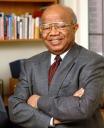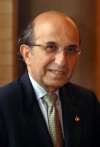Assistant Secretary Russlynn Ali
United States Department of Education, Office of Civil Rights

President Barack Obama nominated Russlynn Ali as assistant secretary for civil rights at the U.S. Department of Education on March 18, 2009, and she was confirmed by the U.S. Senate on May 1, 2009. As assistant secretary, Ali is Secretary Duncan’s primary adviser on civil rights and responsible for enforcing U.S. civil rights laws as they pertain to education—ensuring the nation's schools, colleges and universities receiving federal funding do not engage in discriminatory conduct related to race, sex, disability or age.
The Office for Civil Rights (OCR) enforces five major civil rights laws that prohibit discrimination in programs or activities receiving federal financial assistance: Title VI of the Civil Rights Act of 1964; Title IX of the Education Amendments of 1972; Section 504 of the Rehabilitation Act of 1973; the Age Discrimination Act of 1975; and Title II of the Americans with Disabilities Act of 1990. OCR also enforces provisions of the Boy Scouts of America Equal Access Act (Sec. 9525 of the No Child Left Behind Act).
Until her appointment to the Department of Education, Russlynn Ali had been a vice president of the Education Trust in Washington, D.C., and the founding executive director of the Education Trust-West in Oakland, Calif., since 2001. In those positions, she developed and implemented a long-range strategy to close achievement gaps among public school students in California; worked with school districts to improve curriculum and instructional quality at high-poverty and high-minority public schools; and designed, field-tested and implemented comprehensive audit tools that examined inequities in schools and districts. She also advised legislative and gubernatorial staff as well as senior education experts on education matters in the state in addition to assuming fundraising and operational responsibilities as a member of the senior management team at Education Trust.
Ali received her J.D. from Northwestern University School of Law. She received her bachelor’s degree in law and society from the American University. She also attended Spelman College.
The Office for Civil Rights (OCR) enforces five major civil rights laws that prohibit discrimination in programs or activities receiving federal financial assistance: Title VI of the Civil Rights Act of 1964; Title IX of the Education Amendments of 1972; Section 504 of the Rehabilitation Act of 1973; the Age Discrimination Act of 1975; and Title II of the Americans with Disabilities Act of 1990. OCR also enforces provisions of the Boy Scouts of America Equal Access Act (Sec. 9525 of the No Child Left Behind Act).
Until her appointment to the Department of Education, Russlynn Ali had been a vice president of the Education Trust in Washington, D.C., and the founding executive director of the Education Trust-West in Oakland, Calif., since 2001. In those positions, she developed and implemented a long-range strategy to close achievement gaps among public school students in California; worked with school districts to improve curriculum and instructional quality at high-poverty and high-minority public schools; and designed, field-tested and implemented comprehensive audit tools that examined inequities in schools and districts. She also advised legislative and gubernatorial staff as well as senior education experts on education matters in the state in addition to assuming fundraising and operational responsibilities as a member of the senior management team at Education Trust.
Ali received her J.D. from Northwestern University School of Law. She received her bachelor’s degree in law and society from the American University. She also attended Spelman College.
Michael Brown, Co-Founder and CEO
City Year, Inc.

Michael Brown is the Co-Founder and CEO of City Year, a nonprofit organization built on the belief that young people can change the world. Founded in 1988, City Year unites young people of all backgrounds for a year of full-time service. This year 1,400 young leaders are making a difference in the lives of children and transforming schools and neighborhoods across the United States and in South Africa.
More than 10,000 City Year corps members have served more than 16 million hours as tutors, mentors and role models to more than one million children, engaging one million citizens in their work, and earning access to $39 million in college scholarships through the AmeriCorps National Service Trust. City Year was an inspiration for the federal AmeriCorps initiative through which 500,000 Americans have served their country.
For his work developing City Year, Michael Brown has been awarded several distinctions, most notably the Reebok Human Rights Award, and four honorary degrees. He was named one of America’s Best Leaders by US News and World Report in 2006.
Mr. Brown is a graduate of Harvard College and Harvard Law School, where he served as a member of the Harvard Law Review. Prior to starting City Year, Mr. Brown served as a legislative assistant to Congressman Leon Panetta and as a clerk for Federal Judge Stephen Breyer.
More than 10,000 City Year corps members have served more than 16 million hours as tutors, mentors and role models to more than one million children, engaging one million citizens in their work, and earning access to $39 million in college scholarships through the AmeriCorps National Service Trust. City Year was an inspiration for the federal AmeriCorps initiative through which 500,000 Americans have served their country.
For his work developing City Year, Michael Brown has been awarded several distinctions, most notably the Reebok Human Rights Award, and four honorary degrees. He was named one of America’s Best Leaders by US News and World Report in 2006.
Mr. Brown is a graduate of Harvard College and Harvard Law School, where he served as a member of the Harvard Law Review. Prior to starting City Year, Mr. Brown served as a legislative assistant to Congressman Leon Panetta and as a clerk for Federal Judge Stephen Breyer.
Dr. James P. Comer, Associate Dean and Maurice Falk Professor of Child Psychiatry
Yale School of Medicine

James P. Comer, M.D., M.P.H., the Maurice Falk Professor of Child Psychiatry at the Yale University School of Medicine's Child Study Center, has been a Yale medical faculty member since 1968. During these years, he has concentrated his career on promoting a focus on child development as a way of improving schools. His efforts in support of healthy development of young people are known internationally.
Dr. Comer, perhaps, is best known for the founding of the Comer School Development Program in 1968, which promotes the collaboration of parents, educators, and community to improve social, emotional, and academic outcomes for children that, in turn, helps them achieve greater school success. His concept of teamwork has improved the educational environment in more than 500 schools throughout America.
A prolific writer, Dr. Comer has authored nine books and between 1978 and 1994, Dr. Comer wrote more than 150 articles for Parents Magazine and more than 300 syndicated articles on children's health and development and race relations.
In addition to his writing, teaching and research activities, Dr. Comer has served as a consultant to the Children's Television Workshop, which produces Sesame Street and The Electric Company. He was a consultant to the Public Committee on Mental Health chaired by Rosalyn Carter as well as a member of the National Board for Professional Teaching Standards, and Carnegie Forum on Education and the Economy (1987-1991). Since 1994, Dr. Comer has served as a member of the National Commission on Teaching and America's Future. He is a member of the Institute of Medicine and the American Association for the Advancement of Science (AAAS). He has provided testimony before state and congressional legislative bodies.
He chaired the Roundtable on Child and Adolescent Development Research and Teacher Education, organized by the National Association for the Accreditation of Teacher Education (NCATE) and the National Institute of Child Health and Human Development (NICHD). He served on the Association for Supervision and Curriculum Development's Commission on the Whole Child and contributed to the 2007 report, The Learning Compact Redefined: A Call to Action: A Report of the Commission on the Whole Child.
For his work and his scholarship, Dr. Comer has been awarded 46 honorary degrees and has been recognized by many organizations.
A native of East Chicago, IN, Dr. Comer received an A.B. degree in 1956 from Indiana University, an M.D. degree in 1960 from Howard University College of Medicine, and an M.P.H. in 1964 from the University of Michigan School of Public Health. Between 1964 and 1967, he trained in psychiatry at the Yale University School of Medicine and its Child Study Center. He also completed one year of residency training at the Hillcrest Children's Center in Washington, D.C.
Dr. Comer, perhaps, is best known for the founding of the Comer School Development Program in 1968, which promotes the collaboration of parents, educators, and community to improve social, emotional, and academic outcomes for children that, in turn, helps them achieve greater school success. His concept of teamwork has improved the educational environment in more than 500 schools throughout America.
A prolific writer, Dr. Comer has authored nine books and between 1978 and 1994, Dr. Comer wrote more than 150 articles for Parents Magazine and more than 300 syndicated articles on children's health and development and race relations.
In addition to his writing, teaching and research activities, Dr. Comer has served as a consultant to the Children's Television Workshop, which produces Sesame Street and The Electric Company. He was a consultant to the Public Committee on Mental Health chaired by Rosalyn Carter as well as a member of the National Board for Professional Teaching Standards, and Carnegie Forum on Education and the Economy (1987-1991). Since 1994, Dr. Comer has served as a member of the National Commission on Teaching and America's Future. He is a member of the Institute of Medicine and the American Association for the Advancement of Science (AAAS). He has provided testimony before state and congressional legislative bodies.
He chaired the Roundtable on Child and Adolescent Development Research and Teacher Education, organized by the National Association for the Accreditation of Teacher Education (NCATE) and the National Institute of Child Health and Human Development (NICHD). He served on the Association for Supervision and Curriculum Development's Commission on the Whole Child and contributed to the 2007 report, The Learning Compact Redefined: A Call to Action: A Report of the Commission on the Whole Child.
For his work and his scholarship, Dr. Comer has been awarded 46 honorary degrees and has been recognized by many organizations.
A native of East Chicago, IN, Dr. Comer received an A.B. degree in 1956 from Indiana University, an M.D. degree in 1960 from Howard University College of Medicine, and an M.P.H. in 1964 from the University of Michigan School of Public Health. Between 1964 and 1967, he trained in psychiatry at the Yale University School of Medicine and its Child Study Center. He also completed one year of residency training at the Hillcrest Children's Center in Washington, D.C.
Chancellor Joel Klein
New York City Department of Education

Joel I. Klein became New York City schools chancellor in July 2002 after serving in the highest levels of government and business. As Chancellor, he oversees more than 1,500 schools with 1.1 million students, 136,000 employees, and a $21-billion operating budget.
When Mayor Michael R. Bloomberg appointed Mr. Klein, a graduate of New York City public schools, as the first Chancellor of the newly-reorganized Department of Education, he called the new Chancellor “a true leader who never shies away from the tough and sometimes controversial decisions that are necessary to implement change.”
Mr. Klein’s comprehensive education reform program, Children First, is transforming the nation's largest public school system into a system of great schools. The first steps of the reform effort included ending social promotion in third, fifth, seventh, and eighth grades; creating a wide array of academic supports for struggling students; establishing new supports for parents, including putting a parent coordinator in nearly every school; and expanding small schools and charter schools to provide more high-quality educational options for students. The second phase of Children First involved restructuring the system, changing how schools are operated and supported, and giving principals greater control over how they run their schools while holding them accountable for results. These initiatives have made a real difference for New York City students -- achievement is up, students and families have more and better choices, schools are safer, and principals are more empowered.
From 1997 to 2001, Mr. Klein was assistant attorney general in charge of the U.S. Department of Justice’s antitrust division. He also served as Acting Assistant Attorney General and as the antitrust division’s principal Deputy Assistant Attorney General. His appointment to the U.S. Justice Department came after Klein served two years (1993-95) as deputy counsel to President William J. Clinton.
Mr. Klein received his BA from Columbia University, from which he graduated magna cum laude/Phi Beta Kappa in 1967 and went on to earn his J.D. from Harvard Law School in 1971, again graduating magna cum laude.
When Mayor Michael R. Bloomberg appointed Mr. Klein, a graduate of New York City public schools, as the first Chancellor of the newly-reorganized Department of Education, he called the new Chancellor “a true leader who never shies away from the tough and sometimes controversial decisions that are necessary to implement change.”
Mr. Klein’s comprehensive education reform program, Children First, is transforming the nation's largest public school system into a system of great schools. The first steps of the reform effort included ending social promotion in third, fifth, seventh, and eighth grades; creating a wide array of academic supports for struggling students; establishing new supports for parents, including putting a parent coordinator in nearly every school; and expanding small schools and charter schools to provide more high-quality educational options for students. The second phase of Children First involved restructuring the system, changing how schools are operated and supported, and giving principals greater control over how they run their schools while holding them accountable for results. These initiatives have made a real difference for New York City students -- achievement is up, students and families have more and better choices, schools are safer, and principals are more empowered.
From 1997 to 2001, Mr. Klein was assistant attorney general in charge of the U.S. Department of Justice’s antitrust division. He also served as Acting Assistant Attorney General and as the antitrust division’s principal Deputy Assistant Attorney General. His appointment to the U.S. Justice Department came after Klein served two years (1993-95) as deputy counsel to President William J. Clinton.
Mr. Klein received his BA from Columbia University, from which he graduated magna cum laude/Phi Beta Kappa in 1967 and went on to earn his J.D. from Harvard Law School in 1971, again graduating magna cum laude.
Dr. Pedro Noguera, Peter L. Agnew Professor of Education
New York University

Pedro Noguera is the Peter L. Agnew Professor of Education at New York University. He holds tenured faculty appointments in the departments of Teaching and Learning and Humanities and Social Sciences at the Steinhardt School of Culture, Education and Development and in the Department of Sociology at New York University. He is also the Executive Director of the Metropolitan Center for Urban Education and the co-Director of the Institute for the Study of Globalization and Education in Metropolitan Settings (IGEMS). In 2008 Noguera was appointed by New York Governor David Patterson to serve on the State University of New York Board of Trustees.
Noguera has held tenured faculty appoints at the Harvard Graduate School of Education and at the University of California, Berkeley. He has published over one hundred and fifty research articles, monographs and research reports on topics such as urban school reform, conditions that promote student achievement, youth violence, the potential impact of school choice and vouchers on urban public schools, and race and ethnic relations in American society. His work has appeared in several major research journals and many are available online at inmotionmagazine.com. He is the author of The Imperatives of Power: Political Change and the Social Basis of Regime Support in Grenada (Peter Lang Publishers, 1997), City Schools and the American Dream (Teachers College Press 2003), Unfinished Business: Closing the Achievement Gap in Our Nation’s Schools (Josey Bass, 2006) City Kids, City Teachers with Bill Ayers and Greg Michie (New Press 2008), and his most recent book is The Trouble With Black Boys…and Other Reflections on Race, Equity and the Future of Public Education (Wiley and Sons, 2008). Noguera has also appeared as a regular commentator on educational issues on CNN, National Public Radio, and other national news outlets.
Noguera has held tenured faculty appoints at the Harvard Graduate School of Education and at the University of California, Berkeley. He has published over one hundred and fifty research articles, monographs and research reports on topics such as urban school reform, conditions that promote student achievement, youth violence, the potential impact of school choice and vouchers on urban public schools, and race and ethnic relations in American society. His work has appeared in several major research journals and many are available online at inmotionmagazine.com. He is the author of The Imperatives of Power: Political Change and the Social Basis of Regime Support in Grenada (Peter Lang Publishers, 1997), City Schools and the American Dream (Teachers College Press 2003), Unfinished Business: Closing the Achievement Gap in Our Nation’s Schools (Josey Bass, 2006) City Kids, City Teachers with Bill Ayers and Greg Michie (New Press 2008), and his most recent book is The Trouble With Black Boys…and Other Reflections on Race, Equity and the Future of Public Education (Wiley and Sons, 2008). Noguera has also appeared as a regular commentator on educational issues on CNN, National Public Radio, and other national news outlets.
moderated by
Dean Kathleen McCartney
Harvard Graduate School of Education

Kathleen McCartney is the Dean of the Faculty of Education at the Harvard Graduate School of Education and the Gerald S. Lesser Professor in Early Childhood Development. She is a developmental psychologist whose research informs theoretical questions on early experience as well as policy questions on child care, early childhood education, and poverty. Since 1989, she has served as a principal investigator on the National Institute of Child Heath and Human Development (NICHD) Study of Early Child Care & Youth Development, the findings from which were published by Guilford in 2005 book, Child Care and Child Development. McCartney is a co-editor of The Handbook of Early Child Development, published by Blackwell in 2006 as well as Best Practices in Quantitative Methods for Developmentalists, published by the Society for Research in Child Development in 2006. McCartney’s work has been informed by her experience as the director of the University of New Hampshire Child Study & Development Center, a laboratory school for children from birth through kindergarten. She has been named a Fellow by the American Psychological Association, the American Psychological Society, and the American Educational Research Association.
Dean McCartney received her B.A. summa cum laude from Tufts University, her M.S. in Psychology from Tufts University and her Ph.D. in Psychology from Yale University.
Dean McCartney received her B.A. summa cum laude from Tufts University, her M.S. in Psychology from Tufts University and her Ph.D. in Psychology from Yale University.
